Understanding the Reach and Methodology of CBT
As alcohol addiction remains a significant public health concern, with millions affected each year, Cognitive Behavioral Therapy (CBT) emerges as a leading therapeutic intervention. Aimed at reshaping thought patterns that contribute to addictive behaviors, CBT is increasingly recognized for its efficacy in treating Alcohol Use Disorder (AUD). This article delves into the nuances of CBT, its mechanisms, benefits, and comparative effectiveness in the realm of addiction treatment, providing insights for those considering it as a potential solution.
Defining Cognitive Behavioral Therapy and Its Fit for AUD
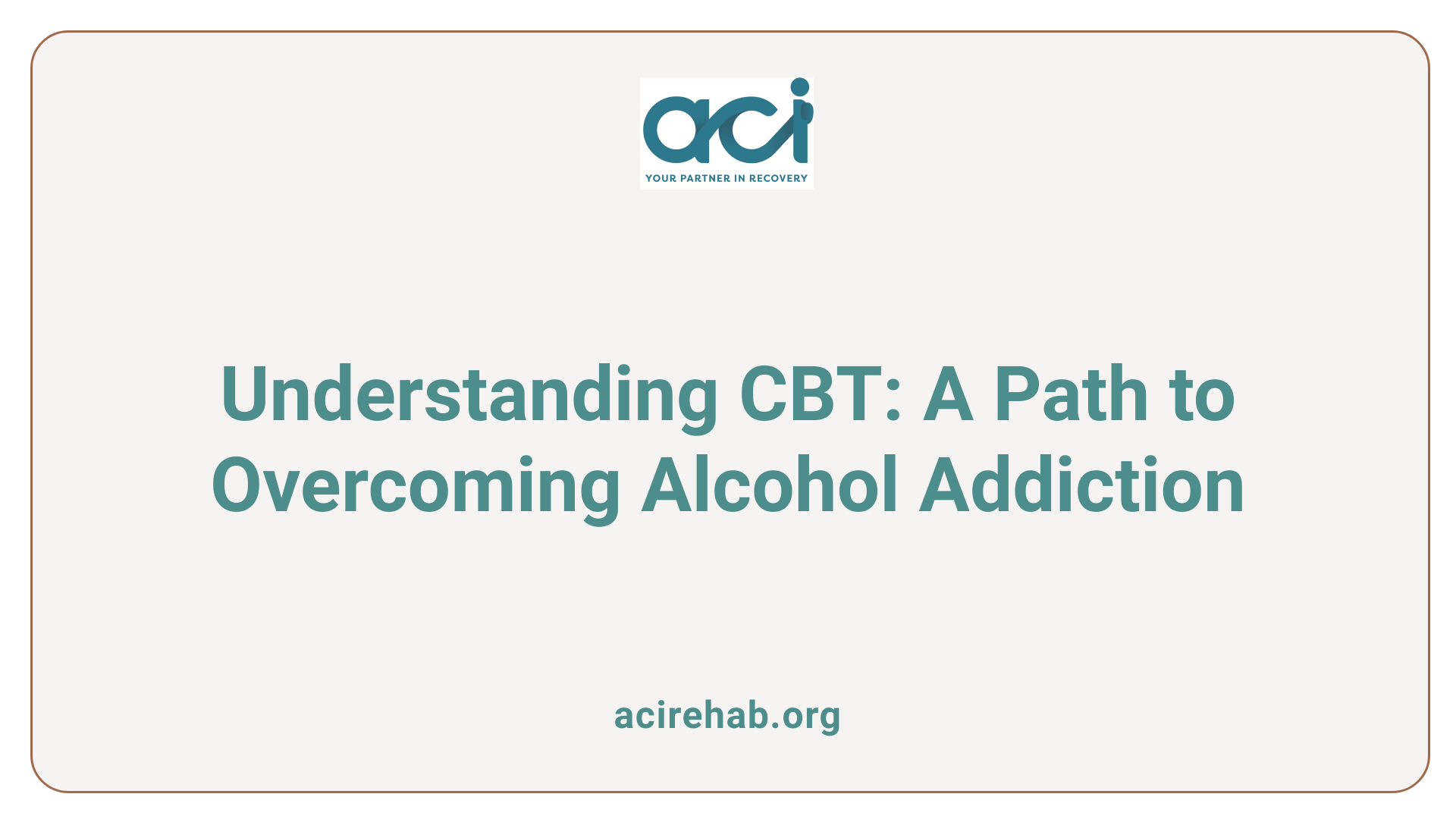
What is cognitive-behavioral therapy (CBT) and why is it suitable for treating alcohol addiction?
Cognitive-behavioral therapy (CBT) is a structured psychotherapy designed to help individuals alter negative thought patterns and behaviors. For those battling alcohol use disorder (AUD), CBT effectively analyzes the cognitive distortions that contribute to their substance use. This therapy empowers individuals to develop coping skills, improve self-control, and recognize high-risk scenarios that may trigger cravings.
CBT is particularly suitable for treating AUD because it focuses on present challenges rather than delving deeply into past issues. It encourages individuals to identify and modify maladaptive thoughts and feelings associated with their drinking habits. With its evidence-based framework, CBT provides practical strategies that help sustain recovery over time, making individuals better equipped to handle future challenges related to alcohol use.
Moreover, the flexibility of CBT allows it to be tailored to individual experiences and needs, which enhances its effectiveness. This adaptability also means it can be complemented with other treatment modalities, such as pharmacotherapy or support groups, creating a multifaceted recovery approach. By integrating CBT with medications like naltrexone, clients often experience improved outcomes, such as reduced relapse rates.
Overall, CBT serves as a valuable cornerstone in treating alcohol addiction, addressing the thought patterns that underpin substance use while empowering individuals with the skills to reclaim their lives.
The Cognitive Approach within CBT for Alcohol Addiction
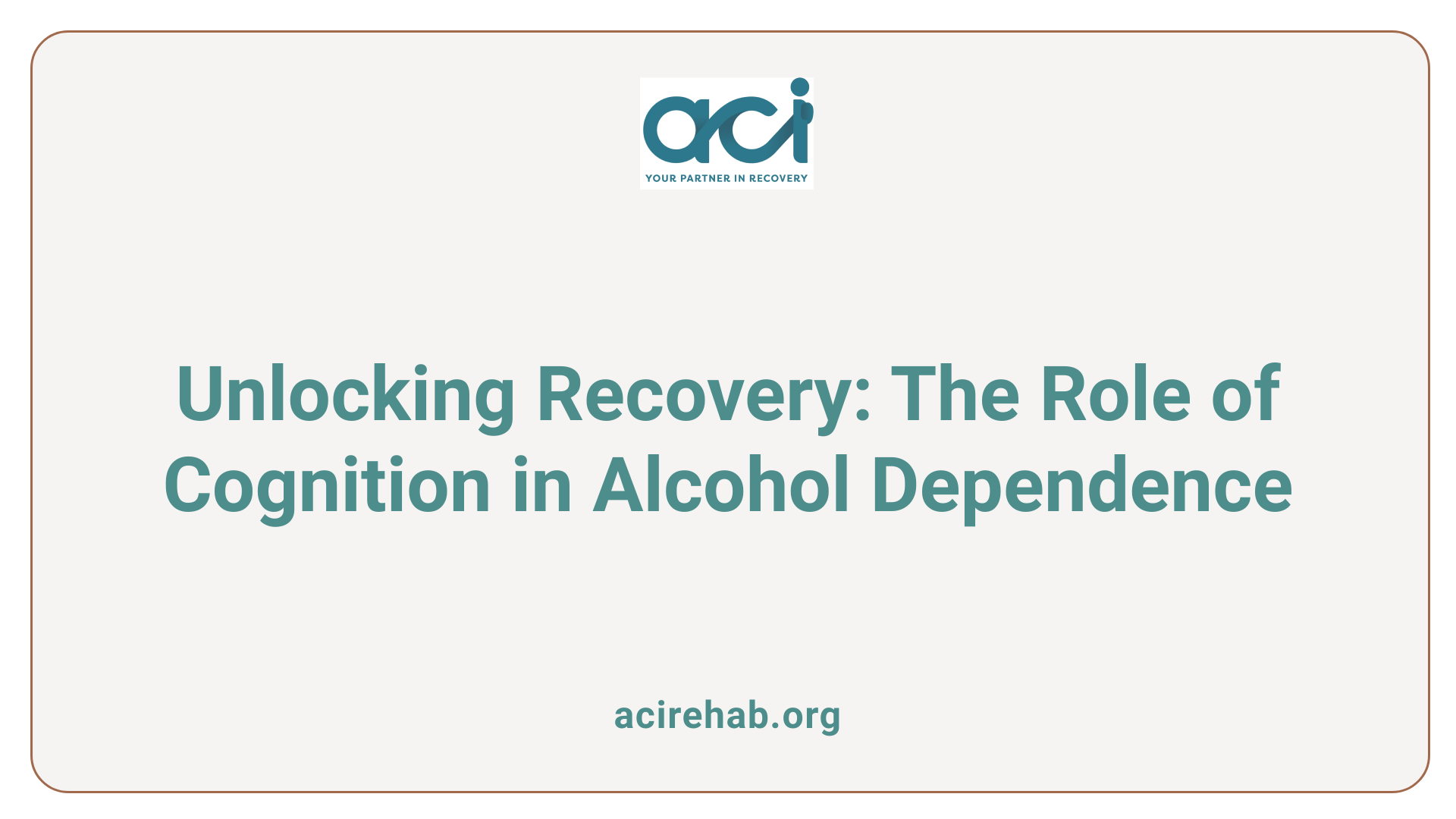
How does the cognitive approach within CBT help address alcohol addiction?
The cognitive approach within Cognitive Behavioral Therapy (CBT) is pivotal in tackling alcohol addiction by focusing on modifying learned behaviors and internal thought patterns linked to drinking. It initiates with an assessment of individual drinking patterns, inviting clients to reflect on their motivations for alcohol consumption. By doing so, the therapy reveals hidden triggers, which may include social pressures, emotional states, or past experiences.
Moving beyond understanding, CBT equips individuals with practical tools. Techniques such as coping skills training are central, enabling clients to navigate high-risk situations effectively and manage cravings. Furthermore, relapse prevention strategies are incorporated, teaching patients how to identify early warning signs of returning to old habits.
Important to this cognitive approach are the developments in both intrapersonal and interpersonal skills. Enhancing decision-making and problem-solving abilities aids individuals in handling challenging situations. Simultaneously, improving assertiveness allows them to refuse alcohol offers confidently and build supportive social networks. This two-pronged skill enhancement ensures that sobriety becomes not just an absence of drinking but a genuinely healthier lifestyle.
In sum, the cognitive framework of CBT comprehensively supports sobriety while addressing broader psychosocial factors. Such an integrated approach is critical for achieving long-term recovery and overall well-being.
Effectiveness of CBT Compared to Other Therapies
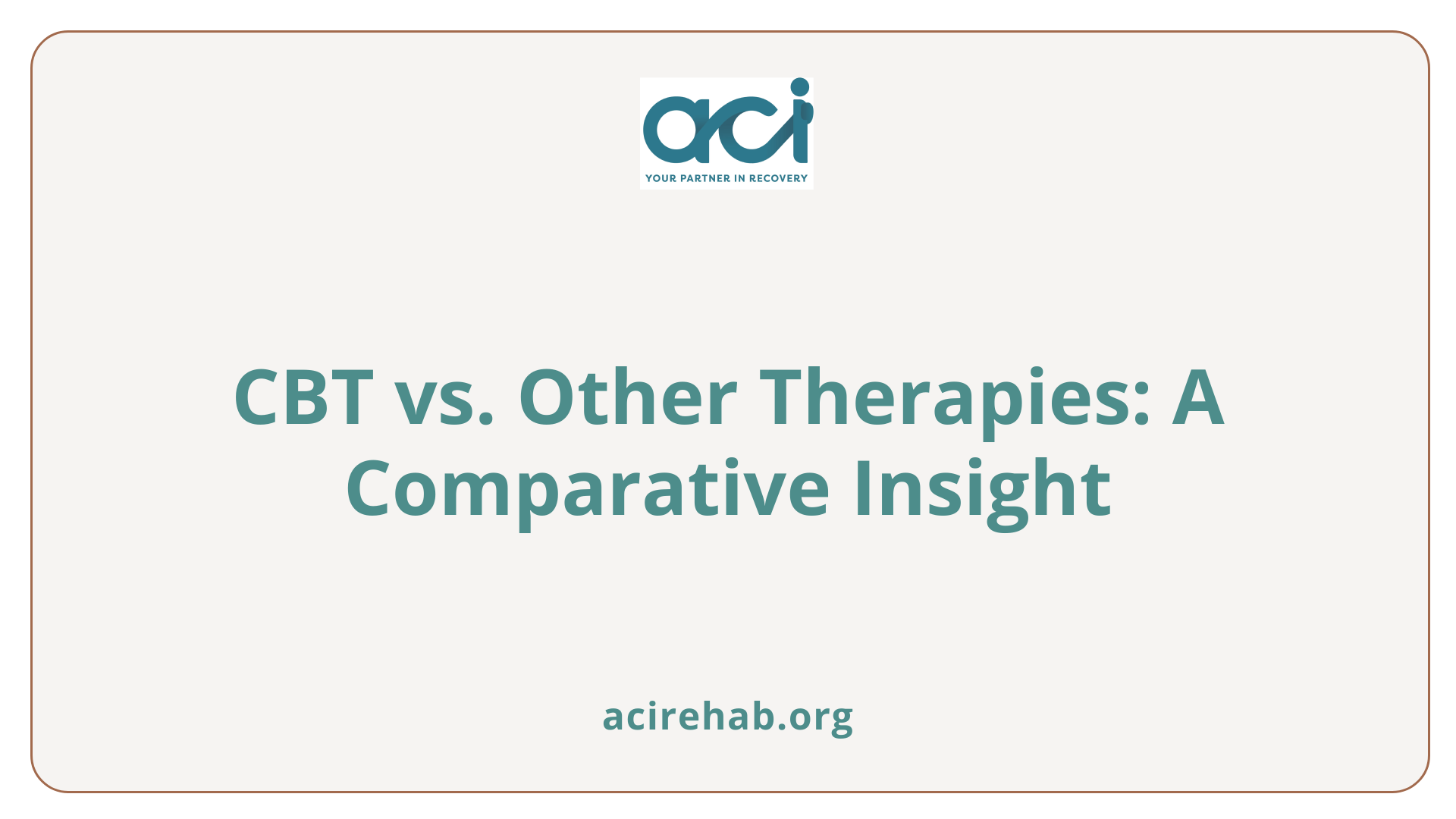
How effective is CBT in treating alcohol addiction compared to other therapeutic approaches?
Cognitive Behavioral Therapy (CBT) is widely recognized as the gold standard for treating alcohol use disorder (AUD), supported by extensive scientific evidence demonstrating its effectiveness. Research shows that CBT effectively reshapes distorted thought patterns that lead to harmful alcohol-related behaviors. These cognitive shifts can significantly enhance an individual’s quality of life.
Typically, CBT treatment consists of 5 to 20 sessions, custom-designed to meet individual needs. The therapy focuses on critical skills such as managing cravings, developing coping strategies, and preventing relapse. A meta-analytic review indicates that CBT produces moderate effect sizes in treating substance use disorders, including AUD.
While other therapeutic approaches, such as FDA-approved medications or mutual support groups like Alcoholics Anonymous, are beneficial, CBT stands out due to its structured and problem-focused approach. For instance, combining CBT with medications like naltrexone has shown even better results in reducing cravings and relapse rates.
In practice, CBT equips individuals with a toolbox of coping skills to handle high-risk situations and emotional triggers. This comprehensive ability to address both cognitive and behavioral aspects of addiction makes CBT a vital component of many recovery programs, often utilized alongside other therapies to achieve the best outcomes for individuals tackling alcohol addiction.
CBT’s Dual Components in Addressing AUD
Functional Analysis
Functional analysis is a crucial first step in Cognitive Behavioral Therapy (CBT) for Alcohol Use Disorder (AUD). This component involves identifying the thoughts, feelings, and situations that trigger alcohol use. By mapping these connections, individuals can gain insights into their behavior, recognizing patterns that contribute to their addiction. This awareness serves as a foundation for change, enabling clients to analyze their drinking habits in context with their emotions and environmental cues.
Skills Training
Accompanying functional analysis is skills training, which focuses on developing healthier coping strategies. Participants learn various techniques aimed at replacing alcohol use with positive actions. This includes stress management, effective communication, and problem-solving abilities tailored to maintain sobriety. As they apply these skills, individuals enhance their resilience against cravings, learn to navigate high-risk scenarios, and build self-control.
Benefits and Applications in AUD Treatment
The combination of functional analysis and skills training in CBT yields substantial benefits for those struggling with AUD. Research indicates that approximately 60% of individuals undergoing CBT can maintain recovery for a year or more. Additionally, CBT effectively reduces relapse rates by empowering individuals to confront triggers and manage their emotions.
CBT’s goal-orientated approach, typically spanning about twelve sessions, allows for measurable improvement in recovery outcomes. By equipping clients with practical tools and fostering self-awareness, CBT not only aids in overcoming addiction but also encourages sustained long-term recovery.
Sustainability of CBT Outcomes
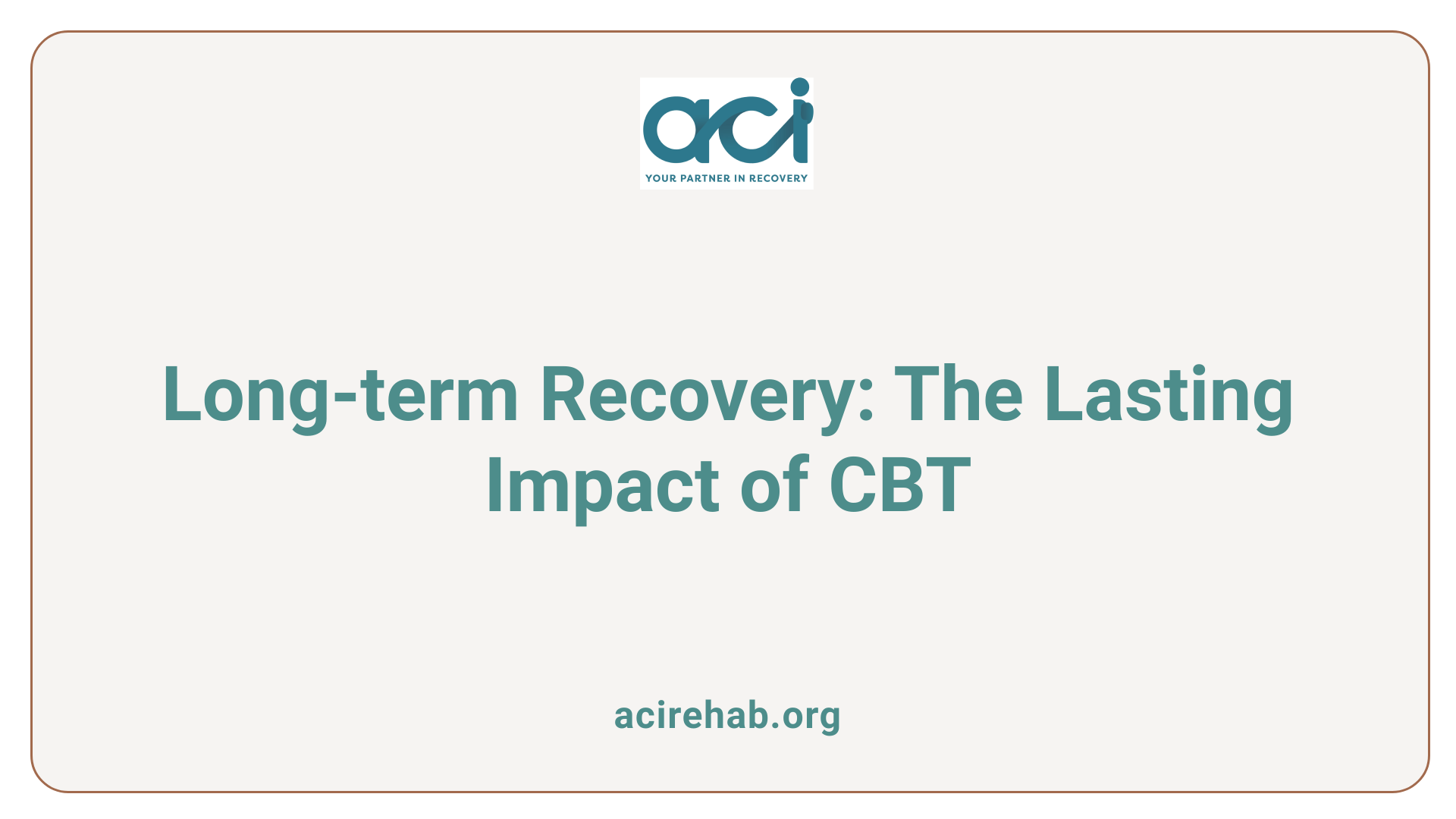
Enduring Nature of Skills Learned
Cognitive Behavioral Therapy (CBT) offers individuals the opportunity to develop valuable skills that are sustainable well beyond the therapy sessions. Research indicates that about 60% of individuals treated with CBT for substance use problems maintain their recovery for at least a year. This longevity suggests that the skills acquired during CBT, such as effective coping strategies and enhanced self-awareness, significantly contribute to long-term recovery.
Impact on Relapse Rates and Recovery Maintenance
CBT is instrumental in reducing relapse rates among those struggling with Alcohol Use Disorder (AUD). By empowering individuals to identify their triggers and develop strategies to manage their cravings, CBT equips them with tools to navigate high-risk situations. Participants often build a robust toolbox of strategies that help minimize the risk of relapse. Notably, studies have shown that when CBT is combined with medications like naltrexone, the chances of relapse decrease even further. Thus, CBT plays a crucial role in not just immediate recovery but in sustaining long-term success in overcoming alcohol addiction.
Scientific Backing and Research on CBT
What Does Research Say About CBT for Alcohol Addiction?
Cognitive Behavioral Therapy (CBT) is widely supported by research as an effective treatment for alcohol use disorder (AUD). Numerous studies highlight its capability to help individuals identify and change the negative thought patterns leading to alcohol dependency.
What Evidence is There from Randomized Controlled Trials?
Over 53 randomized controlled trials have evaluated CBT in the context of alcohol and drug abuse. These trials consistently demonstrate that CBT not only effectively reduces substance use but also enhances overall treatment outcomes. A 2020 systematic review further confirmed that CBT combined with medication yielded significant improvements for individuals facing AUD.
Insights from Meta-Analytic Reviews
Meta-analyses provide additional insights into the efficacy of CBT. One review showed a moderate effect size in reducing substance use. Importantly, the benefits of CBT persisted even months after treatment had concluded, indicating that the skills gained are sustainable. However, some reviews underscore the need for continued research to better understand the specific mechanisms through which CBT achieves its positive effects on addiction treatment.
| Type of Study | Findings | Year |
|---|---|---|
| Randomized Trials | Over 53 trials confirm CBT’s effectiveness for substance use disorders. | Various |
| 2020 Systematic Review | CBT combined with medication proves effective for AUD. | 2020 |
| Meta-analyses | Moderate effect sizes noted; skills are sustainable post-treatment. | Recent |
CBT’s Flexibility and Accessibility in Treatment
Short-term and goal-oriented nature
Cognitive Behavioral Therapy (CBT) is known for its effectiveness in treating alcohol use disorder, often requiring about twelve sessions to yield noticeable results. This short-term and goal-oriented approach allows individuals to focus on actionable solutions, optimizing their therapy experience and enhancing engagement in the recovery process.
Adaptation to individual needs
CBT is adaptable, catering to the unique needs of individuals facing alcohol addiction. Therapists utilize functional analysis to help patients understand their specific triggers, beliefs, and situations leading to substance use. Skills training then equips them with personalized coping mechanisms relevant to their challenges, thereby improving self-efficiency and resilience against cravings.
Innovative delivery methods like digital CBT
Emerging delivery methods, such as digital CBT programs, expand access to treatment for those seeking help for alcohol addiction. These platforms allow individuals to engage with therapy at their convenience, promoting adherence and enhancing treatment outcomes. Research indicates that such digital programs, coupled with weekly monitoring, significantly support individuals in avoiding alcohol, showcasing the versatility of CBT in addressing addiction.
Integrating CBT with Pharmacotherapy and Other Strategies
Combination with Medications
Cognitive Behavioral Therapy (CBT) has demonstrated significant effectiveness when combined with pharmacotherapy for treating alcohol use disorder (AUD). Medications like naltrexone can be particularly effective, as they help to reduce cravings and the rewarding effects of alcohol. Research indicates that combining these medications with CBT treatment enhances overall outcomes, resulting in lower relapse rates and better management of cravings.
For instance, studies show that individuals receiving both CBT and naltrexone had improved chances of abstaining from alcohol compared to those who only received therapy or medication alone. This combination allows patients to leverage the strengths of both therapeutic approaches, addressing both the psychological aspects of addiction through CBT while also managing biological factors through medication.
Role in Comprehensive Recovery Plans
CBT is commonly included as part of a comprehensive recovery plan for individuals struggling with AUD. This holistic approach combines CBT with other treatment modalities such as outpatient programs, counseling, and support groups. Each component plays a vital role in addressing the multifaceted nature of addiction.
For example, while CBT equips individuals with coping strategies and cognitive restructuring techniques, additional support from counseling provides emotional guidance and peer connection. Together, these elements help bolster resilience against alcohol use, ultimately promoting long-term recovery outcomes. Research suggests that CBT’s integration into comprehensive plans significantly enhances individuals’ ability to maintain sobriety and manage life’s challenges effectively.
Empowering Individuals through CBT: Skills and Coping Strategies
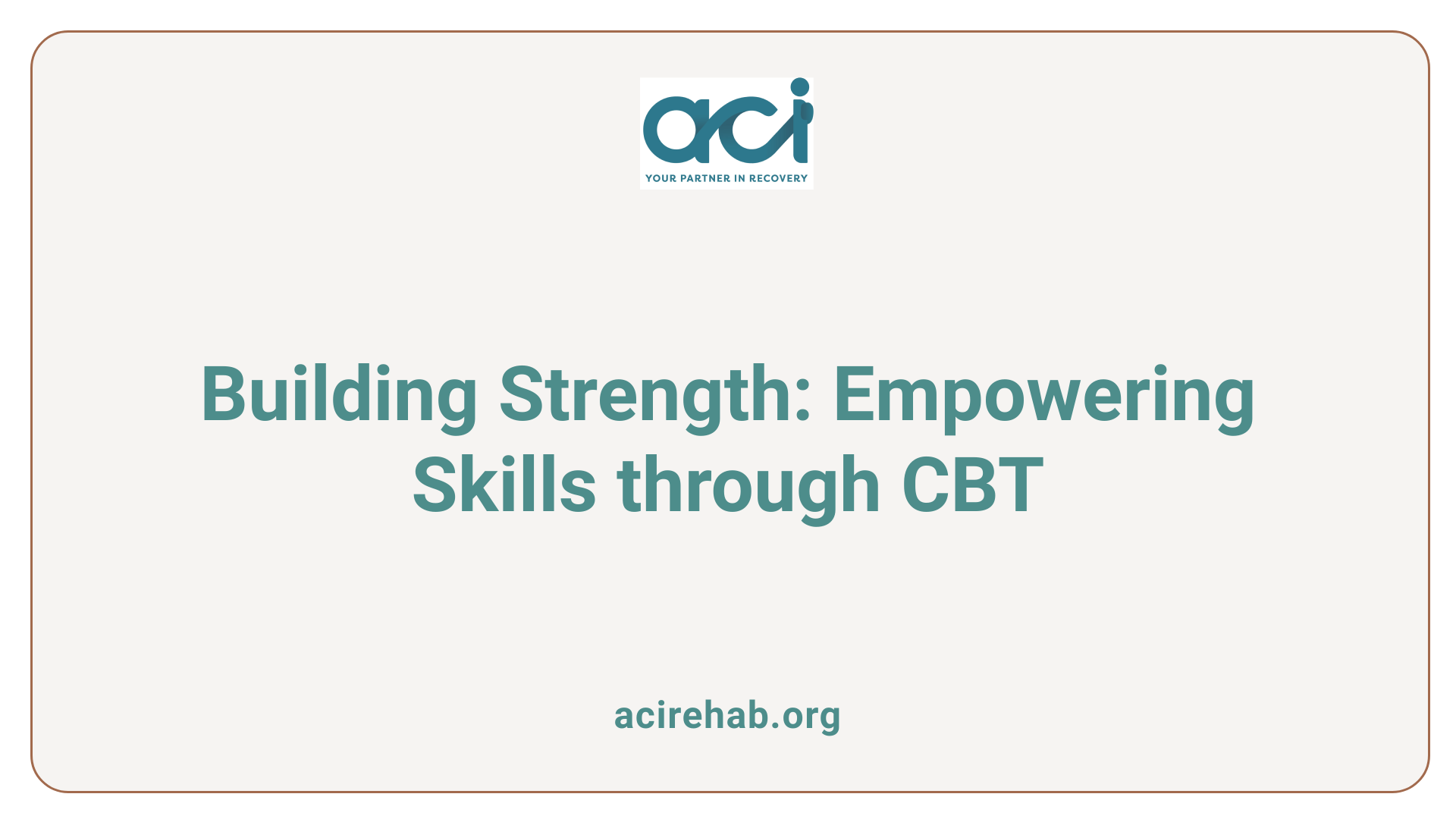
Self-control and Emotional Regulation
Cognitive Behavioral Therapy (CBT) emphasizes the development of self-control and emotional regulation, which are critical for individuals recovering from alcohol use disorder (AUD). By identifying and challenging negative thought patterns, CBT helps clients develop healthier coping strategies to deal with cravings and emotional upheaval.
Participants learn to recognize high-risk situations that may trigger alcohol use and cultivate the skills necessary to manage these scenarios effectively. Through techniques like cognitive restructuring and behavioral experiments, clients enhance their ability to respond to stress without resorting to alcohol, significantly reducing the risk of relapse.
Building Resilience and Preventing Relapse
Building resilience is a central focus of CBT, equipping individuals with tools to handle life’s challenges without turning to alcohol. The therapy encourages clients to identify their strengths and apply them to overcome obstacles. CBT cultivates coping strategies through skills training and functional analysis, fostering sustainable recovery.
Techniques such as exposure therapy and mindfulness practices empower clients to face their fears and manage emotions. This proactive approach to emotional regulation enables individuals to establish a solid foundation for long-term recovery from AUD.
Embracing CBT as a Pathway to Recovery
Cognitive Behavioral Therapy stands out as a pivotal instrument in the battle against alcohol addiction. By helping individuals understand and modify the cognitive and behavioral underpinnings of their addiction, CBT offers a robust framework for recovery. When integrated with other treatment modalities, it amplifies the potential for sustained sobriety and improved quality of life. As research continues to unravel its full capabilities, CBT remains a cornerstone of evidence-based addiction treatment, guiding countless individuals toward a healthier future.
References
- Cognitive Behavioral Therapy (CBT) for Alcoholism
- SAMHSA’s National Helpline
- CBT for Alcoholism and Drug Addiction: Does It Work? – Verywell Mind
- Cognitive Behavioral Therapy (CBT) For Alcohol Addiction
- Cognitive Behavioral Therapy for Drinking: How to Curb Your …
- Cognitive-Behavioral Therapy for Substance Use Disorders – PMC
- The search for mechanisms of cognitive behavioral therapy for …
- CBT for Alcoholism and Drug Addiction: Does It Work? – Conifer Park
- Benefits of Behavioral Therapy for Alcohol Addiction in Caseyville, IL
- Cognitive Behavioral Therapy (CBT) for Addiction & Substance Abuse

